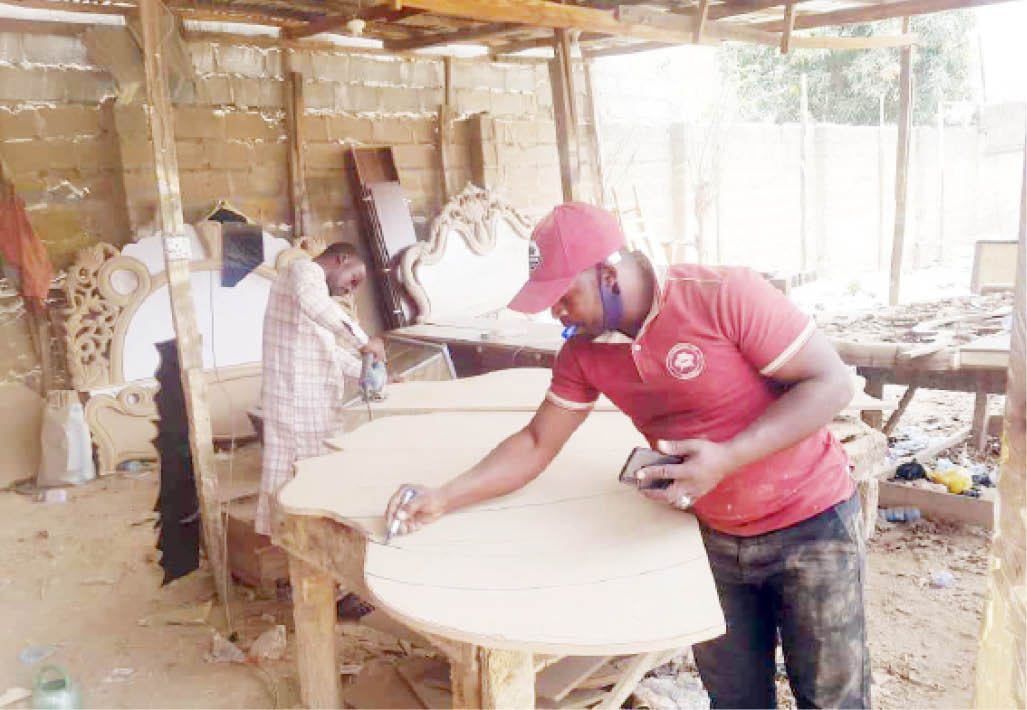How furniture making is taking Kano youths off streets
There is a renewed business orientation towards furniture making among the youth in Kano metropolis, Kano/Jigawa Chronicle has observed. This is sequel to the recent emergence and spread of furniture making workshops around the city. The business, which was initially more or less a preserve of the elderly, has recently attracted many young people […]

One of the furniture workshops at the Gandu layout of Kano metropolis
There is a renewed business orientation towards furniture making among the youth in Kano metropolis, Kano/Jigawa Chronicle has observed.
This is sequel to the recent emergence and spread of furniture making workshops around the city.
The business, which was initially more or less a preserve of the elderly, has recently attracted many young people who went into the industry with new innovations, and their products are competing favourably with imported furniture in markets and stores across the city.
Our correspondents observed that the dividing line that usually characterised the locally made and imported furniture has been blurred with the new creativity exuded recently into the industry by these groups of enterprising youths.
The development is said to be redirecting the attention of many young men in the commercial city from idleness into becoming productive and responsible citizens.
The boom in the furniture industry may not be unconnected with the cultural practices of people of the state, especially in contracting marriages where furniture, popularly known in local parlance as parts of Kayan Daki constitutes part of the essentials as required by Hausa tradition.
Kano/Jigawa Chronicle observed that some of the young men driving the industry suspended their formal education at secondary school level, while a few graduates have found passion and opportunities in the business.
Some of the artisans in the booming industry expressed satisfaction with the business. They, however, lamented the high cost of raw materials.
Hamisu Ya’u Yola, one of the furniture designers, said he ventured into the business since his childhood at Rimi Market and later relocated to Gandun Albasa.
“This business provides me with all the necessary things in life. I am an expert in making beds, wardrobes and more. I taught many youths; and presently, I have about seven boys under me. Very soon they will also go on their own.
“Our furniture is very good, to the extent that we are even competing with international companies,” he said.
He said one of their major challenges was the hike in the price of raw materials.
“You can buy something today, and before the next day it would increase by almost half or even double; and this poses a great challenge,” he said.
Abba Dauda Darmanawa described furniture making as a wide business that can accommodate many.
“Some are making chairs, some beds, some wardrobes, and some do the designing. We have sub segments. For example, the skeleton of a chair is something on its own, and thousands of youths are doing it. Some just put foam on the skeleton, while those at the material segment cover the foam.
“Since I became independent in 2011, five people have also gone through my tutelage and are now independent and teaching others.
“This business has done everything for me. I built my own house, I am married and happy with my wife and children.
“No doubt, our products are competing with imported ones. What is happening is that we sometimes copy their own, and sometimes we produce what is even better than theirs,’’ he added.
Kamsusu Sabiu, the chief executive officer of Hanifa Furniture Gallery, also shares his experience in the industry.
He said, “I learnt the skills for over 12 years before I became an expert and opened my own shop, where I sell the products.
“This business is good for me. I have a lot of things. I went to Hajj and paid for others. I have a family and over 30 people under me; and they are making it.”
On challenges facing the business, Sabiu said the market situation had changed.
“The market has expanded and demand increased, but the cost of products is increasing. There is no specific price due to changes in the price of raw materials. This is one of the great challenges we are facing.
“All these fancy furniture designs you see are our products. They look like imported products, but we did them here. One of the advantages of our own is that it can be disassembled and reassembled at any time, but that is not possible with the imported ones,” he said.
On styles he said, “We have different types of products, such as Royal. Some are even sold at more than N1million and some N700,000 and below.
“The youth dominate the market, unlike before. I am 36 years old. After my diploma I never thought of looking for any job because I wanted to employ, not to be employed.”
On the prospects of the business, Sabiu said, “We hope to see that products do not only compete with foreign ones but replace them everywhere.”
